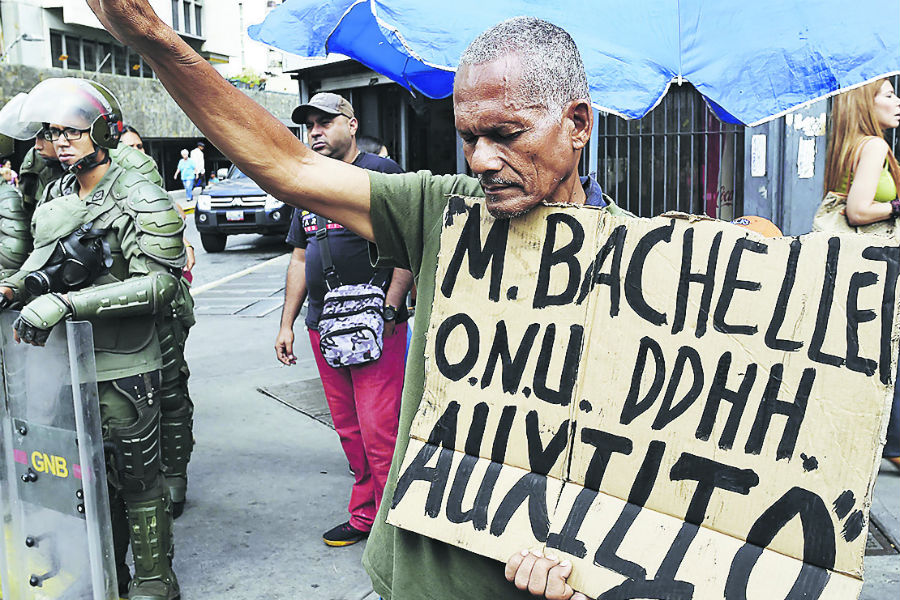After the recent proposal to lift European sanctions, the Venezuelan NGO Laboratorio de Paz released a report under the title UE: Embargo de armas y sanciones individuales contra violadores de derechos humanos en Venezuela (EU: Arms embargo and targeted sanctions on human rights abusers in Venezuela.”
A decision by the European Union to resume arms exports to Venezuela, a country where the International Criminal Court is currently investigating crimes against humanity, risks creating the conditions for renewed human rights violations.
The report
On October 24, 2023, the Spanish Minister of Foreign Affairs, José Manuel Albares, asked the European Union to lift sanctions on Venezuela, following a similar decision by the United States, “given the progress of the negotiations between the Government and the opposition.” “I have approached my colleagues to raise the need to ponder a review of the EU sanctions on Venezuela, in line with recent decisions by the United States and given the positive evolution of the dialogue between Venezuelans,” Albares said. As he explained, the head of European diplomacy, Josep Borrell, had been in favor of addressing the issue at an upcoming meeting of EU Ministers of Foreign Affairs scheduled for November 13, 2023.
Unlike the sanctions promoted by the United States, the measures approved by the European Union are individual and targeted in nature. In brief, they consist of the embargo on arms and equipment intended for internal repression, as well as a travel ban and an asset freeze on 55 officials responsible for human rights violations and for undermining democracy and the rule of law in Venezuela. In this regard, the Council of the EU has reiterated through different statements that “[t]hese measures were designed not to harm the Venezuelan population whose plight the EU wishes to alleviate”.
Given that these measures are not of a financial nature nor do they aggravate the Complex Humanitarian Emergency, and in the absence of real political will from the national authorities to allow democratic solutions to the crisis – as has been recently pointed out by the UN Secretary-General and the IACHR-, and sanction human rights violations, Laboratorio de Paz believes that their lifting would be counterproductive.
According to figures from the Stockholm International Peace Research Institute (SIPRI), a total of 5.615 billion dollars worth of arms were exported to Venezuela between 1998 and 2022. Spain and the Netherlands rank third and fourth – after Russia and China – as the countries that have sold the most weapons to the Bolivarian governments. As a whole, the countries of the European bloc are responsible for 16.15% of the arms purchased by Venezuela in this period. In the case of Spain, the country sold a total of 327 million dollars worth of arms, including 5,638,952 euros in riot control equipment.
In 2014, Spain made the largest sale of equipment to Venezuela under the category of “Other material”, which includes riot control items for a total of 1,483,263 euros. That same year witnessed a wave of anti-government protests that extended through several months, which according to a report by Amnesty International left a death toll of at least 37 victims and more than 550 injured, while a further 2,000 were arrested and faced legal proceedings for their participation in the demonstrations.
In this case, different human rights organizations have questioned Spain’s arms sales to countries of “concern” due to internal conflicts or serious abuses against the population. The 2013 campaign Armas bajo control (Arms Under Control) warned that “the interest of the Spanish Government in selling arms risks relaxing its human rights standards”
Laboratorio de Paz agrees with the warnings about the negative effect of the so-called financial sanctions on Venezuela and has supported the demand of international human rights organizations for their flexibilization, as has been recognized in the so-called “Barbados Agreement” signed between the government and the opposition. However, the organization considers the targeted nature of the sanctions designed by the European Union, which focus on officials who violate human rights and on the sale of arms to the country, lifting them would be counterproductive as long as the conditions established by the EU are not met: a) The holding of credible and meaningful elections; b) The respect for democratic institutions; c) The adoption of a full electoral calendar, and d) The liberation of all political prisoners.
Laboratorio de Paz calls on the EU not to lift the embargo on arms sales to the Venezuelan government nor to withdraw individual sanctions on the 55 officials responsible for human rights violations in the country. Instead, the organization urges the Council of the European Union to extend the sanctions for an additional 12 months, until November 2024, the date on which some of the requirements established by the bloc for their lifting could be met. The international community must maintain diplomatic mechanisms of pressure on the Venezuelan authorities to deter abuses against the population and allow elections with guarantees of free participation that enable a transition to democracy.
Laboratorio de Paz
Laboratorio de Paz is a Venezuelan think tank founded in 2012 to research, analyze, generate and disseminate recommendations that contribute to the resolution of conflicts through an interdisciplinary approach that incorporates democracy, nonviolence and human rights, by prioritizing emerging and vulnerable communities based on the right to peace, the right to participation and cultural rights.
See the full report in Spanish HERE
Translated by Jose Rafael Medina




